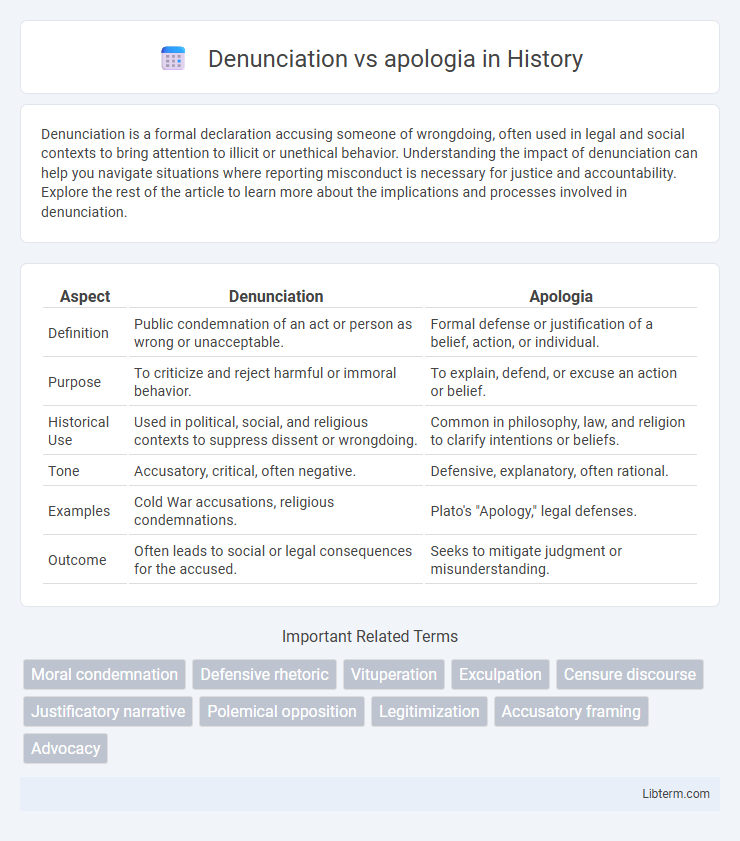Denunciation is a formal declaration accusing someone of wrongdoing, often used in legal and social contexts to bring attention to illicit or unethical behavior. Understanding the impact of denunciation can help you navigate situations where reporting misconduct is necessary for justice and accountability. Explore the rest of the article to learn more about the implications and processes involved in denunciation.
Table of Comparison
| Aspect | Denunciation | Apologia |
|---|---|---|
| Definition | Public condemnation of an act or person as wrong or unacceptable. | Formal defense or justification of a belief, action, or individual. |
| Purpose | To criticize and reject harmful or immoral behavior. | To explain, defend, or excuse an action or belief. |
| Historical Use | Used in political, social, and religious contexts to suppress dissent or wrongdoing. | Common in philosophy, law, and religion to clarify intentions or beliefs. |
| Tone | Accusatory, critical, often negative. | Defensive, explanatory, often rational. |
| Examples | Cold War accusations, religious condemnations. | Plato's "Apology," legal defenses. |
| Outcome | Often leads to social or legal consequences for the accused. | Seeks to mitigate judgment or misunderstanding. |
Understanding Denunciation and Apologia
Denunciation involves publicly condemning actions or individuals to express moral disapproval and influence social norms, often highlighting wrongdoing to deter similar behavior. Apologia is a formal defense or justification of a person's actions or beliefs, aiming to mitigate blame and restore reputation by presenting arguments and evidence. Understanding denunciation and apologia reveals their contrasting roles in social discourse: one to censure and the other to defend, both shaping public perception and accountability.
Defining Denunciation: Purpose and Scope
Denunciation serves as a public condemnation aimed at expressing strong disapproval of actions, behaviors, or ideas deemed harmful or unethical within societal or legal frameworks. Its purpose centers on deterrence, moral guidance, and reinforcing communal standards by openly criticizing the subject in question. The scope of denunciation extends to legal contexts, social movements, and political discourse where it functions as a tool for accountability and societal correction.
Apologia Explained: Meaning and Context
Apologia refers to a formal written or spoken defense of a belief, action, or doctrine, aimed at clarifying misunderstandings or justifying a position. It originates from the Greek term for a speech in defense and is commonly used in philosophical, legal, and religious contexts to present rational explanations or counter accusations. Unlike denunciation, which condemns or criticizes, apologia seeks understanding and persuasion through reasoned argumentation.
Historical Evolution of Denunciation and Apologia
Denunciation and apologia have evolved distinctly throughout history, with denunciation often emerging as a public condemnation aimed at asserting social or political norms, while apologia developed as a structured defense that seeks to justify or explain actions or beliefs. Historically, denunciations were prominent in legal and religious contexts, serving to uphold communal standards by exposing perceived wrongdoings. Apologia gained prominence in classical rhetoric, especially through works like Plato's "Apology," where moral and philosophical defenses became essential in public discourse and legal settings.
Key Differences Between Denunciation and Apologia
Denunciation involves publicly condemning or expressing strong disapproval of an action, behavior, or belief, emphasizing moral judgment and social condemnation. Apologia, in contrast, is a formal defense or justification aimed at explaining and excusing one's actions or beliefs to mitigate criticism. The key differences lie in their intent--denunciation seeks to censure, while apologia aims to defend--and their communicative approach, with denunciation focusing on reproach and apologia on rationalization.
Rhetorical Strategies in Denunciation
Denunciation employs rhetorical strategies such as strong emotive language, moral condemnation, and vivid imagery to assert the speaker's position and discredit the opposing view. It often utilizes repetition, direct address, and stark contrasts to provoke an emotional response and persuade the audience of the subject's wrongdoing. These tactics aim to establish authority, create a sense of urgency, and reinforce social or ethical boundaries.
Techniques of Apologia in Communication
Techniques of apologia in communication include denial, which rejects the occurrence of the offensive act, and bolstering, where the speaker emphasizes positive traits to counterbalance negative perceptions. Differentiation separates the act from more objectionable behavior to minimize blame, while transcendence reinterprets the act within a broader or more acceptable context. These techniques strategically manage accusations and restore credibility in crisis communication.
Real-World Examples of Denunciation vs Apologia
Denunciation involves openly condemning wrongful acts, as seen in the public statements by whistleblowers exposing corporate fraud, while apologia entails defending or justifying actions under scrutiny, exemplified by political figures issuing detailed statements to refute allegations. For instance, during the Enron scandal, whistleblowers denounced unethical accounting practices, whereas company executives engaged in apologia to protect their reputations. These real-world cases highlight how denunciation seeks to hold individuals accountable, whereas apologia aims to mitigate damage through strategic defense.
Impact on Public Perception and Discourse
Denunciation often shapes public perception by framing behaviors or ideas as morally unacceptable, prompting social condemnation and reinforcing societal norms. Apologia serves to defend or justify actions, aiming to mitigate negative judgments and influence discourse by presenting alternative narratives or explanations. Both strategies significantly affect public discourse, with denunciation typically polarizing opinions while apologia can foster dialogue and reconsideration.
Choosing Between Denunciation and Apologia
Choosing between denunciation and apologia hinges on the desired rhetorical impact and audience perception. Denunciation aggressively condemns an opponent's actions to delegitimize their position, often mobilizing support through moral outrage. Apologia strategically defends and justifies one's own actions to preserve credibility and mitigate damage to reputation, emphasizing explanation over condemnation.
Denunciation Infographic

 libterm.com
libterm.com